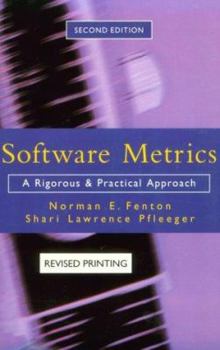Software Metrics: A Rigorous and Practical Approach, Revised
Select Format
Select Condition 
Book Overview
The first book to provide a coherent and rigorous framework for controlling, managing, and predicting various aspects of software development processes. Fenton and Pfleeger apply basic ideas in... This description may be from another edition of this product.
Format:Paperback
Language:English
ISBN:0534954251
ISBN13:9780534954253
Release Date:February 1998
Publisher:Course Technology
Length:638 Pages
Weight:1.70 lbs.
Customer Reviews
3 ratings
Topics not found in other software testing books!
Published by Thriftbooks.com User , 19 years ago
You have to check this book out: Here is a summary of the TOC: 1. Introdution 2. Fundamentals of measurement 3. A Framework of software measurement 4. Experimental design and analysis 5. Software measurement validation 6. Data collection and analysis 7. Setting up a measurement program 8. Measuring process attributes 9. Making process predictions 10. Measuring internal product attributes 11. Measuring external product attributes 12. Resource measurement: productivity 13. Resource measurement: teams and tools 14. History and industrial applications Great reference! Check it out.
Complete, wide in scope and essential
Published by Thriftbooks.com User , 20 years ago
I have a large number of metrics books, including everything written by Grady, Jones, and Florac & Carleton, and this is one of my personal favorites. It not only goes into measurement theory and practice, but covers nearly every key metric associated with software engineering. Instead of writing a tome about what this book contains, I'll confine my comments to what I especially like about it and why.First, the measurement fundamentals, the goal-based measurement framework, and information about data collection and management alone make this book worth owning. Data collection, for example, can waste resources if you try to collect everything, or worse, don't properly manage or analyze it. Follow the process given in the first part of this book and you'll have a solid basis for a metrics initiative.Second, the scope of software engineering metrics is wide and given fairly detailed treatment. I especially like the fact that object-oriented metrics are addressed, and the multi-dimensional approach to measuring internal and external product attributes. Moreover, the scope of this book extends to productivity and resource management, which is where development projects and lifecycle costs associated with maintenance have gaps. Finally, the section on software reliability metrics was excellent and added yet another dimension to the coverage the authors give.Overall, this book is both rigorous and practical as the title implies. The theory and practical applications of measurement and metrics are carefully balanced, and the breadth of material ensures that coverage is complete and addresses all major aspects of software engineering.
excellent survey and critique
Published by Thriftbooks.com User , 27 years ago
(For the full text of this review, see Doctor Dobbs Journal) Software Metrics is not just a thorough, readable survey of the various proposals that have been made over the years for measuring the characteristics of programs; it is also a detailed critique of the sloppy way in which people have tried to use such measurements to predict how much effort would be required to develop and maintain software, and how reliable that software would be. The first part of Software Metrics introduces the fundamentals of measurement theory. What does it mean to measure something? What kinds of measures are there, and -- more importantly -- what kinds of conclusions can we draw from different kinds of measurements? The second part of the book looks at software measurement in particular. Popular measures (COCOMO, function points, cyclometric complexity, and the like) are all described, and their weaknesses pointed out. Again and again, the authors show that the proponents of various metrics have failed to validate their metrics in even the most basic ways... Part Three looks at implementing software measurement in the workplace, and includes an interesting discussion about the nature of empirical research in software engineering. The book closes with a comprehensive annotated bibliography. If you have ever thought about measuring the progress of a software project, or about trying to predict the effort required to develop or maintain a program, this book will tell you what is feasible, what is just hype, and how to tell the difference between the two.





